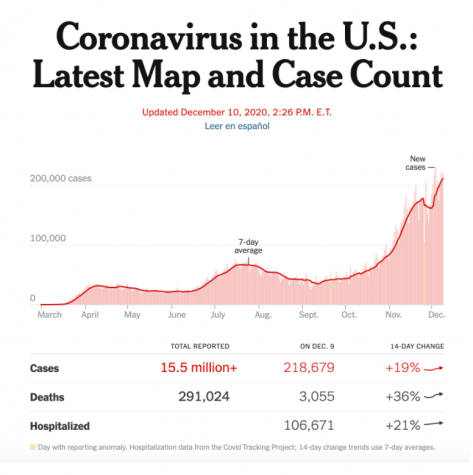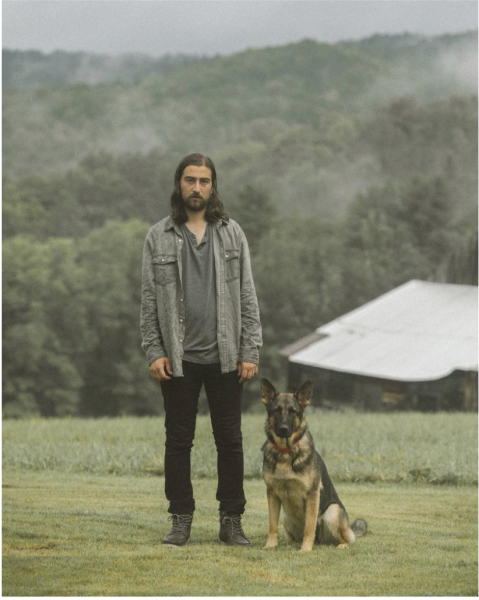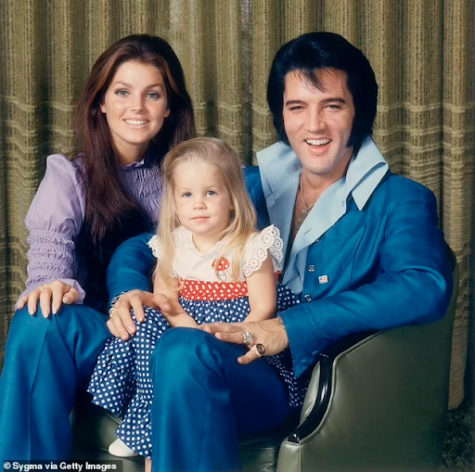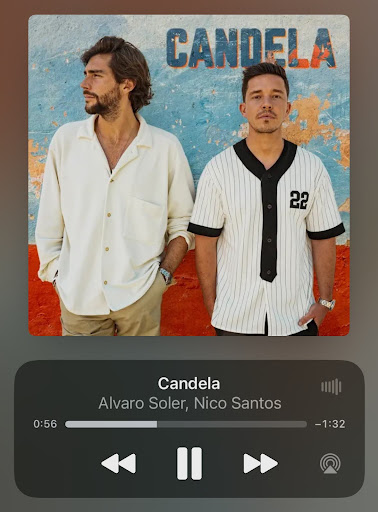I Came, I Saw, I Vaccinated
December 21, 2020
The moment the world has been waiting for: the coronavirus vaccine. With 2,249 US deaths per seven day average, there is a glimmer of hope due to the distribution of the Pfizer-BioNTech vaccine in the UK and Canada following in their footsteps. The current number of total cases in the United States is 15,483,674 and total deaths are 290,992 as of December 10, 2020. It is unfortunately clear that the virus is spreading rapidly, as the U.S. surpassed the highest seven day average of 2,232 deaths recorded on April 17 (NY Times). A frightening statistic states that the U.S. reports more coronavirus deaths in one day than Pearl Harbor or 9/11 (News Nation).

People are approaching the virus with a newfound nonchalance, where a lack of social distancing and masks have become the norm. Many are returning to a pre-pandemic lifestyle, either in their work or social life, and it is obvious through these statistics.
Even though the number of cases are on the rise, the vaccine has left many relieved and hopeful. According to the NY Times, the Pfizer-BioNTech vaccine distribution has run almost entirely smoothly, with the exception of two allergic reactions from health care workers with severe allergies. Both are recovering, but this has caused concern for those who suffer from severe allergies. Dr. Fauci disclosed that vaccines have a rare history of causing allergic reactions, but can happen following testing and during the beginning stages of distribution. Dr. Fauci reassured people with allergies through the fact that there are “other vaccine platforms you can use” that should not cause allergic reactions. UK regulators have advised those who suffer from allergic reactions to wait to take the Pfizer-BioNTech vaccine until there is an explanation. The United Arab Emirates has also approved China’s vaccine, which is 86% effective. China plans to supply it to countries struggling to afford expensive Western vaccines.
On a different note, the US perspective on the vaccine varies, as many Trump supporters have the common mistrust in the vaccine and continue to deny that the pandemic exists. 70% of people need to be given the vaccine to ensure that it is effective, but many Trump supporters refuse to accept the seriousness of the pandemic (CNN). However, 60% of Americans said that they would take the vaccine, according to CNN, so this perspective is not rampant throughout the U.S.. African Americans have also expressed justifiable concern for the vaccine because of former mistreatment in the medical system and non consensual medical experiments in the past. African Americans have low access to health care and are concerned to take the vaccine as a result. According to The Washington Post, “more than 30 percent of African Americans personally know someone who has been killed by the virus compared with 9 percent of White Americans and 17 percent of Hispanics” (Norris). There is a significant racial aspect in this pandemic that is evident through a higher percentage of African American coronavirus deaths, which is often due to a lack of proper healthcare. The Ramapo community has also reported their view on taking the vaccine. Out of 51 people at Ramapo, 32, or 62.8%, responded “yes”, 13, or 25.5%, responded “no”, and 7, or 13.7% responded that they “did not know” to the question of whether they would take the vaccine. It is clear that most participants in this poll would take the vaccine, but the survey definitely mimics the country’s apprehension towards the vaccine through its significant amount of unsureness or outright refusal. The vaccine, no matter how hopeful, has been under speculation for a myriad of reasons and has prompted these types of reactions that often depend on race or political opinion.
Just like the vaccine has provided hope for the world, our very own community has been affected too. Kailey Crotty, a junior who aspires to pursue pharmaceutical medicine, is hopeful. She “feels like the advancements we’ve made throughout his quarantine with the vaccine are very promising” and she is “excited for the future.” Despite her optimistic outlook, Kailey is “both nervous and excited to eventually get the vaccine because we still don’t know the long term side effects yet, which slightly worries me if it’s being given to people all over the world.” This is a common perspective, as this vaccine was made very quickly and medical advancements are often intimidating at first. Not only has the vaccine given Kailey hope, it has increased her interest in pharmaceutical medicine as a career, as “it goes to show how there are always new medicines and vaccines to be created.” Kailey is fascinated and thoroughly impressed with this medical advancement and views the vaccine as a milestone in pharmacology. When asked if Kailey could tell her audience one thing regarding the vaccine, it would be to “not get too excited because a flaw could easily come up and we would have to start again.” Kailey wants people to stay cautious since “vaccines aren’t completely foolproof.” She thinks that people must remain conscientious and safe no matter what and hopes that the vaccine is approached with positivity, as well as caution.
Nurse Sikora and Nurse Elias shared their professional opinion on the vaccine. Nurse
Sikora shared that the Coronavirus vaccine is an mRNA vaccine that differs from traditional vaccines and is developed for emergencies, like COVID-19. “Traditional vaccines use a weakened protein portion of the virus that elicits an immune response that causes your body to make antibodies to it. Thus giving you immunity to the actual virus once your antibodies are made. The mRNA vaccine uses a different method.This method uses part of the virus’s own genes to carry out the response.” Nurse Sikora also quoted Angelica Cifuentes-Kottkamp, an infectious diseases doctor at NYU Langone’s Vaccine Center, in an interview when she explained to Verywell Health that “‘Both DNA and RNA vaccines deliver the message to the cell to create the desired protein so the immune system creates a response against this protein. Then the body is ready to fight it once it sees it again.” Nurse Sikora acknowledged the pros and cons to each type of vaccine, which are that mRNA vaccines are easily and more quickly produced than traditional vaccines. However, “mRNA vaccines have to be kept very cold (-20 to -70 degrees celsius), which may be an issue during transport and for storage.” The side effects to traditional vaccines are better anticipated while mRNA vaccines are less predictable. She also warned people with allergies to consider waiting to take the vaccine for now due to the allergic reactions in the UK (The Wall Street Journal). Nurse Sikora strongly advises seeing a health care provider to discuss whether taking the vaccine is the correct personal choice. She urges that “People should educate themselves, research, & seek guidance before making a decision. Even as a nurse, I feel people should have the right to make their own decisions in regards to their own health decisions. People need to decide what is right for them.” Nurse Elias added that despite the distribution of the vaccine, masks will still be necessary, as “scientists and doctors know the vaccinated person is highly protected from the virus but can not yet ensure the vaccinated person will not be able to transmit the virus to others.” Nurse Elias also understands the hesitation towards the vaccine, “as with anything new, the unknown fuels the hesitation.” She advises scheduling an appointment with a health care provider to discuss “whether the risk of the new vaccine outweighs the benefits.” In the end, “The goal of herd immunity can be achieved with approximately 70% of Americans being inoculated,” so taking the vaccine is encouraged to those who do not suffer from underlying health conditions. Both Nurse Sikora and Nurse Elias believe that taking the vaccine is a personal choice that should be discussed with a health care provider and approached with extensive research and prudence.
All in all, the remarkable development of the Pfizer-BioNtTech and Moderna vaccine acts as a beacon of hope not only for the United States, but for the entire world. Of course, the vaccine is not the end to Coronavirus. There is still a long journey ahead, but after a long year of constant bad news, the vaccine has given the world a wonderful feeling of much needed hope.





